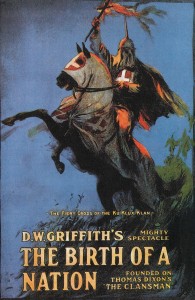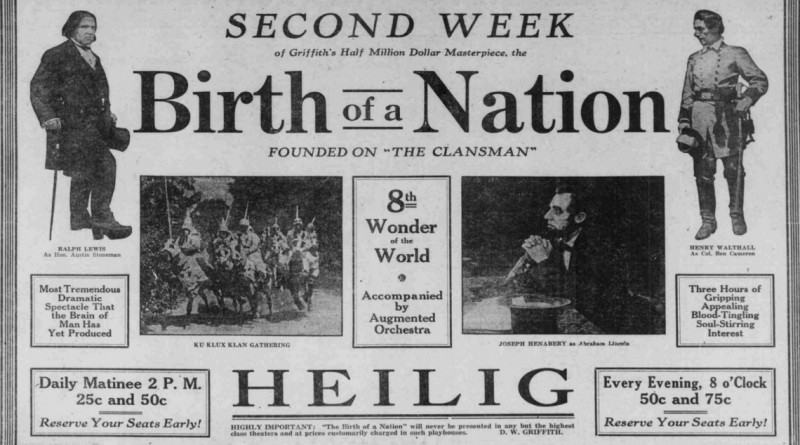Did D. W. Griffith’s “The Birth of a Nation” Play in Halifax?
 In the Saturday, October 1st edition of the Halifax Examiner writer and activist El Jones quotes an academic paper by Greg Marquis on whether D. W. Griffith’s epic motion picture The Birth Of A Nation ever played in Nova Scotia.
In the Saturday, October 1st edition of the Halifax Examiner writer and activist El Jones quotes an academic paper by Greg Marquis on whether D. W. Griffith’s epic motion picture The Birth Of A Nation ever played in Nova Scotia.
Marquis asserts that through researching Nova Scotian newspapers of the time (1915 and 1916) he discovered that The Birth Of A Nation didn’t play in the province in those years. An interesting assertion indeed. Having taught a film history course at the Nova Scotia College of Art and Design in association with the National Film Board of Canada for a decade and a half, I had access to information that disproves Marquis’ claim.
According to my sources, which mostly are gleaned from oral history, Griffith’s notoriously racist film played at the Neptune Theatre site, then called the Strand Theatre. Admission was an extraordinary two dollars, when regular admission to film shows in Halifax was regularly only a nickle. Special trains were run up from Yarmouth for showings of the film in Halifax.
All of this controversy comes exactly on the North American release of the 2016 film Birth Of A Nation. Co-written, directed and starring Nate Parker, an African-American who has had his own share of controversy over a past rape allegation, this new film chronicles the slave rebellion of Nat Turner. It is one of the most hotly anticipated films of the season, having made a splashy debut at the Sundance Festival last January, gaining a $17 million distribution deal and a great deal of publicity.
In an interview with CBS’s 60 Minutes, director Nate Parker forcefully refuted the rape allegations (he was found not guilty in court), spending much of the interview talking up the film and his attempt to “reclaim” the Birth Of A Nation title from Griffith’s tainted and difficult legacy.
Indeed, African Americans and African Canadians actively objected to the racist content of Griffith’s film. In 1918, the novelist Oscar Micheaux turned his book The Homesteader into a feature film as a kind of response, initiating a little-known but fascinating 30-year career making black content movies specifically for black audiences. His final film in 1948, after 39 films, was entitled The Betrayal.
This stream of filmmaking was entirely self-financed, relying on its own exhibition circuit and galaxy of stars. When it finally petered out in the late 1940s there would be a gap in black feature filmmaking that would last until Melvin Van Peebles directed The Story Of A Three-Day Pass in 1967 in France. Even then, the French cultural authorities who financed the film mistakenly thought Van Peebles was of Dutch heritage due to the configuration of his last name.
Hollywood would hire three African American directors in the late 1960s (Van Peebles, Gordon Parks and Ossie Davis) as the ‘Blaxploitation’ movement blossomed, but that’s another story for another day.
As to whether D. W. Griffith’s The Birth Of A Nation ever played in Nova Scotia during the period of its original theatrical run, the answer is yes.
Ron Foley Macdonald
Latest posts by Ron Foley Macdonald (see all)
- Mary Tyler Moore in Nova Scotia - January 30, 2017
- Viola Desmond’s Story on Film - December 11, 2016
- Bruce Springsteen’s “Born to Run” - December 9, 2016


Thank you for this! I expected that it would have played, but then I couldn’t find sources saying it did, and only Marquis’ article. Very glad you have written up this history!
El Jones
No, Birth of a Nation did not play Halifax in 1916 or 17. It was banned in Nova Scotia, though it played in Pictou and New Glasgow in 1916 before the ban. I can cite sources if needed.
According to the Lost Valley Blog written by Ronald J. Jack from Saint John, New Brunswick, BOAN played Halifax at the Academy of Music site (which became the Capitol Theatre, then the Maritime Centre), mid-January, 1917, with a 30 piece orchestra at an admission price of $1.50 in the evening and
$1.00 for matinees. Interestingly, Saint John was where the film distributors’ offices for the
Atlantic region were at the time (actually right up to the 1980s). The article goes on to state
that due to the Halifax Explosion, the controversy over Birth Of A Nation was quickly eclipsed
and most of the records lost.
See: http://thelostvalley.blogspot.ca/2016/09/the-birth-of-nation-d-w-griffiths-epic.html
PK
Interesting, but I see no citations. I can tell you for certain that the film played in Halifax in 1917, yes, but you asserted 1916 based on oral evidence. I have citations from Charlottetown, Amherst, Truro and the Moving Picture World (“Election Now Safe, ‘Nation’ Film Can Show” MPW (Vol.31, No.3) January 20, 1917, p.397) that indicate that the film was not on any screen (outside Pictou and New Glasgow) in 1916. Also, 1.50 and 1.00 was also the charge for any prestige film in the cities of the Maritimes. In Chatham the price ranged from 50 cents to 1.00 for this film. The Explosion also does not effect the historical record until December 1917. And even then, there are few resources missing, only a domination of Explosion news in the papers.